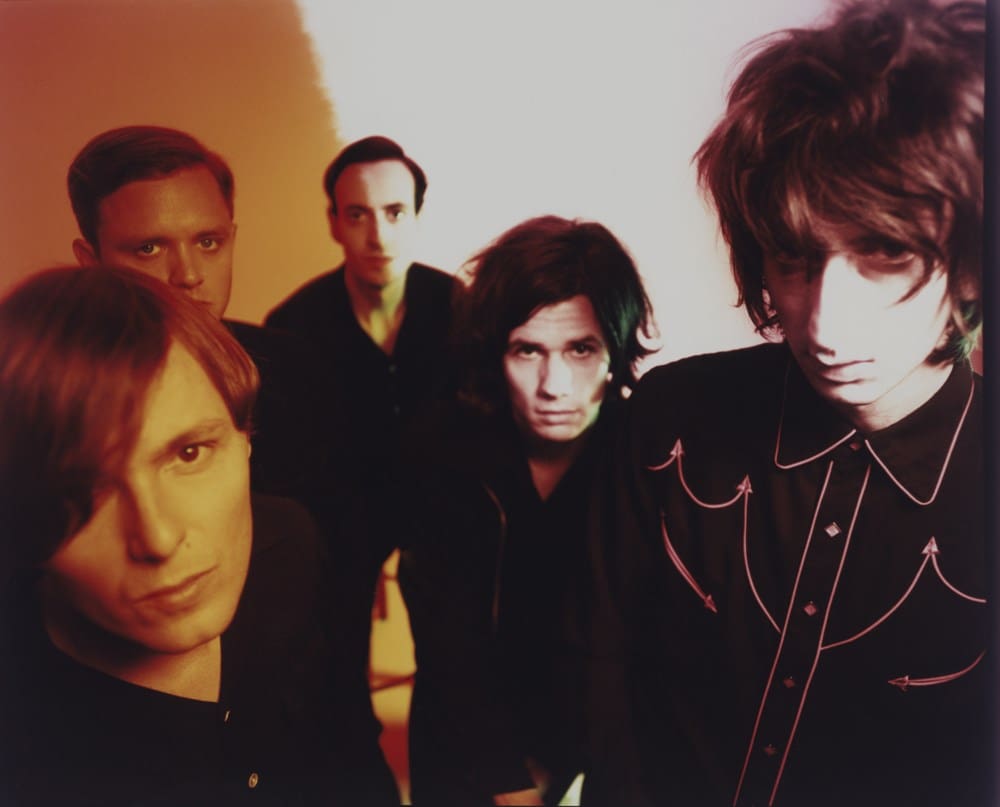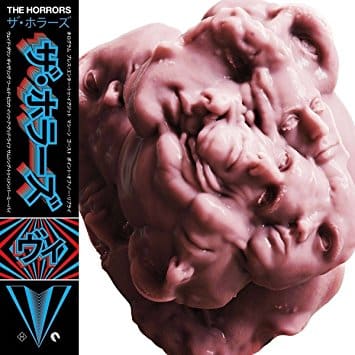
One of the most unique bands in recent years, UK’s The Horrors, have announced an upcoming summer tour here in the US, in support of their most recent album, V (available here), which finds the group maturing into a delightful concoction of dark, moody atmosphere combined with upbeat rhythms and melodies, and an edge to their sound that has evolved from their early days. Keyboardist/synth player Tom Cowan recently took some time to chat with me about where they are now, where he seems them moving, and the unconventional nature of The Horrors themselves.
What can you tell me that was different about the process of putting V together vs. your previous work?
Well the previous two records, we self-produced and recorded most of those ourselves. So this last record, V, we were working with a producer, Paul Epworth. It was kind of a change we wanted to make, because we felt we had got stuck in our ways in our studio, and we weren’t always having the best time. So it was time to bring someone else into the fold, someone else to bounce ideas off during the process; someone who could reassure us that what we were doing was worthwhile.
Would you say that doubt has an effect on the music itself?
I think that is a problem we had, and when that doubt comes in, it can be very difficult and frustrating. And we are quite strong-headed people, and part of what makes us The Horrors is people coming at things from different angles, and we needed someone to kind of pull that all together. So Paul was brilliant at that. That was the major difference [between V and earlier albums], not self-producing or recording ourselves and actually getting into a proper studio for the first time in four or five years.
Did that gap in between studio visits affect the way you approached songwriting?
You know, in the early days, we would go into a rehearsal studio, and someone would have heard something and kind of emulated it, and we would build a song around that, because that is how a lot of bands seem to do it. There was a lot of borrowing going on within the community, but there are only so many four-note riffs you can play. That was kind of how it was, and then it was much more about capturing something. I got more into keyboards and synthesizers, and going from playing bass to that, from note to learning about chords and harmony, that opens up a bit of a different world, songwriting-wise.
What have you learned as you’ve developed your focus more into the keyboard/synthesizer world? Are there any new musical directions you’re starting to pursue?
I guess everyone develops their own way, but I became very interested in electronics, and sort of anti-composition as well. I feel like that’s where I’m at at the moment. When we would try to sit down and start writing something, we would try and make it a Horrors song. Kind of as a reaction, there is a part of me that now encouraged this abstraction, what you can do away from song form and pop music, and it’s almost like a sound collage or something like that. It doesn’t follow the expected curve. So that has been interesting. It’s harder to bring into a band context, because these things don’t tend to exist in the real world perhaps. But in creeps in though.
So describe to me, if you can, the way a Horrors song or album comes together now, with all of this abstraction and everything going.
It can be anything on the spectrum. Some songs are simple as I sit at the piano, play a couple of chords that maybe I had played before, something spontaneous, and that’ll be cool, and we’ll do something with that. A lot of the same parts sort of ended up in the final track of this eight-minute jam. Sometimes it’s like the initial version or recording ended up being a big part of the final recording, or some really abstracted view. We work on stuff as a group. The majority of it was stuff that people had brought in to work on. That seemed to work, doing stuff live, not done in three takes. Sometimes though we have not got the ability to do that, we get frustrated, we can’t hear each other properly, one person is playing perfectly over and over, one person can’t get it right. So we have this kind of electronic group, but it’s still a band.
You’ve mentioned how there lots of different elements in the music that change over time. Do you find that that happens in a live setting as well?
We make these studio creations, and some of them don’t get played live until it is time to play them live, you know? You want to hear yourself make something sound good, and suddenly when you’ve actually been playing it live, it becomes a lot better. All the ideas that actually weren’t good start to fade away as you play and the stronger ideas come out, so it’s an unfortunate process, because you feel like the albums are never going to be as good as they could be, because we don’t want to play the songs out. But people get them on YouTube before they’re supposed to be heard. So it’s a bit of a weird thing that we have to deal with and find the best way around.
So what would you say really goes into making an album a Horrors album? What makes your music so unique?
It’s the weirdest thing, because as I said before, it’s just us. It’s this weird thing that is just us. You know, to be very blunt, I’ll give you a window into what it can be like. I get in later than everyone else. The other guys get in there right on time every day, but sometimes I just sleep on the sofa. But really, if you remove any one of us from the equation, it’s not the same thing anymore.
It’s amazing to hear each other through that much noise. We’ve got these chords happening, and he [guitarist Joshua Hayward] will make the most incredible guitar sounds, he’ll do things that no one else even thought of, and it’s the same for everyone. Everyone is different, but taking one of us away, it’s not The Horrors anymore. Everyone has their contribution and their say, and it’s edited, perfected, and that becomes The Horrors. Sometimes it’s the strangest thing; you know, people’s contributions can be very different, but if they weren’t there, the song would totally change. So it’s a combination of some pretty odd personalities that found each other, and it’s quite unique as well.
Could you describe a little bit of how you feel the band has grown as its own entity since the early days?
I genuinely feel that you meet a lot of bands (and I’ve been doing this for like 13 years now), a lot of people, and lots of them come and go. There’s this moment when you realize that once, you were the hot new thing, and now there have been 38 hot new things, but half of them don’t exist anymore, they burn out. That’s when you realize that you’re lucky to have met all these weird, creative, energetic people. I feel like there is something weird about this combination of personalities, and none of it is really planned. None of us ever planned on being labeled an industrial goth rock band. I actually reject that label, but it seems to happen, it’s this thing we don’t have control of. It’s a really strange thing and kind of a mixed blessing.
We talked earlier about growth as a songwriter. What are you looking forward to in terms of your musical future?
I’ve been into abstraction, as we talked about before. Recently I’ve been scoring for films, and that’s really interesting, because you can actually be really abstract. You’re allowed to be, and it’s expected as part of the process. This isn’t a song, this is you telling a story, or trying to capture emotion. It’s mostly about creating an atmosphere and trying to tell a story, and that’s really different from writing songs. It’s really rewarding, when you get into the thick of collecting sounds and moods, recording with people’s emotions a little bit. It’s really refreshing.
The other thing [I would like to do more of] is just collaborating with people. Our label, Wolftone, did this session, in this studio in a church, and like 23 of us went in there, and it was just this factory where all this great music came out. People who had never worked together or met before, kind of just introducing themselves, and we would just try things. It was just a week of that, and we got like 25 tracks of music, and it’s just there for people to play with and do what they want with. That was really eye-opening. Kind of like wow, can we do this again? Is this a new thing? There are so many people on this label on their own little islands, trying to make their records, and why don’t we work together on one really great album? Why don’t we pool our best ideas and make forever music? It’s not about a band, or you. If you can make a song that has a life beyond you, that is pretty amazing.
When it comes to unique and not-altogether-conventional tunes, The Horrors set the bar pretty high. Don’t miss them coming to the US this summer.
Catch The Horrors at The Asbury Lanes on Friday June 15th. Click here for tickets.
Tickets and show info here: http://www.thehorrors.co.uk/home/


